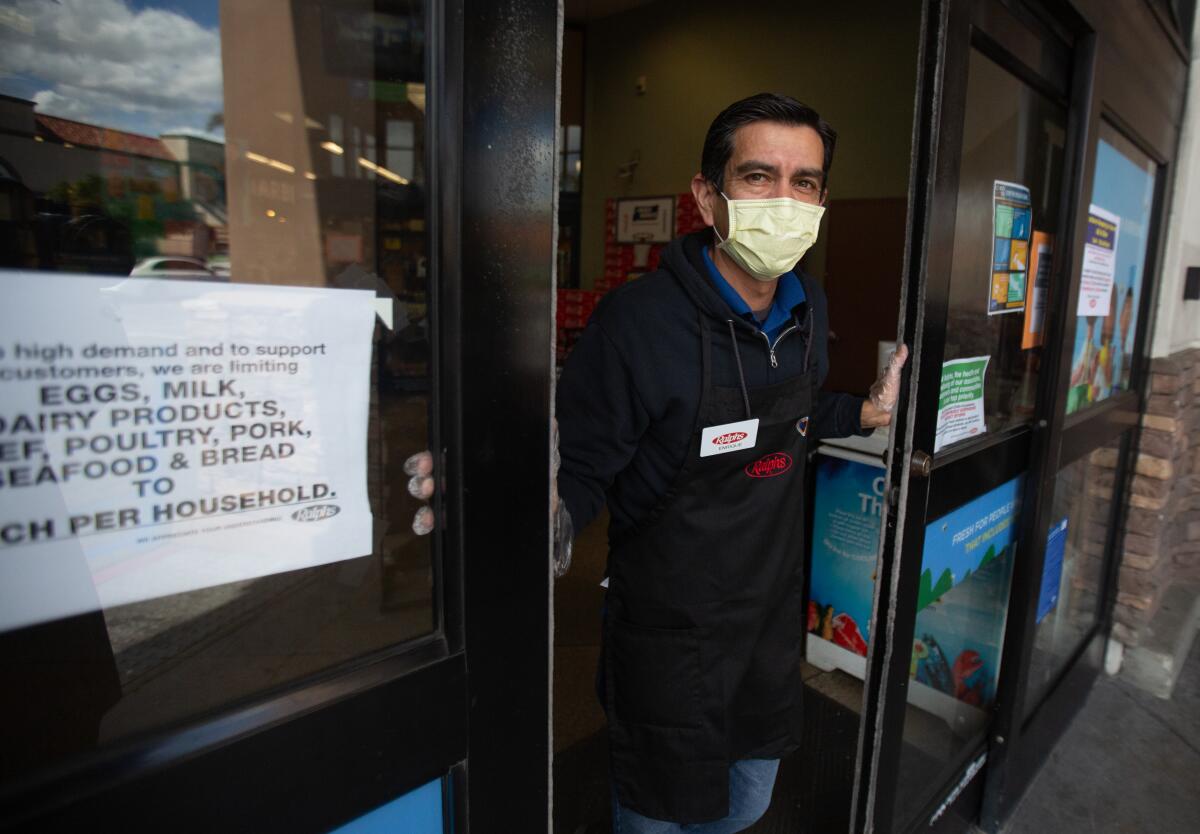Newsletter: If you catch coronavirus at work, who’s responsible?

- Share via
Good morning. I’m Rachel Schnalzer, the L.A. Times Business section’s audience engagement editor, back with a new edition of our revamped newsletter: a one-stop shop for insights on how you and your bank account can weather the COVID-19 pandemic and prepare for whatever the economy might look like on the other side of this. We’ll be arriving in your inbox each Tuesday morning, aiming to help make the challenges of the pandemic just a little less daunting.
Who’s responsible if you get sick at work?
A big issue brewing between workers and their employers is the question of who shoulders the responsibility when an employee contracts the coronavirus. With businesses beginning to reopen in Los Angeles and other parts of the country, it’s likely this tension will continue to grow.
Last week, Gov. Gavin Newsom signed an executive order designed to make workers’ compensation benefits more accessible to essential workers who contract COVID-19, as my colleague Taryn Luna reported. Typically, employees would need to prove they were infected on the job to be eligible for such benefits, but the order instead requires companies or insurers to prove that workers didn’t catch the coronavirus at work — shifting the burden of proof from employees to their employers.
No one wants to be on the hook for workers’ coronavirus infections. After all, even if a business follows every safety guideline after the government allows it to reopen, employees could still become sick.
As Jennifer Haberkorn reports, businesses have defenders in Congress, where Republicans say they will not support a new relief bill unless companies are protected from coronavirus exposure lawsuits. Business groups are pushing hard to win such protections. Many are lobbying for a “higher bar” for allowing workers (or customers or patients) to sue companies if they contract the virus on the premises. Meanwhile, Democrats have been in favor of providing additional protections for workers to ensure they feel secure as businesses reopen, dismissing the idea that employers need more liability protections.
As the Chicago Tribune reports, Illinois was the first U.S. state to alter its workers’ compensation law to put the burden of proof on the employer. This streamlined the process for essential workers to obtain coverage for lost wages, medical bills and more. However, a judge stopped enforcement of this change after business groups sued, saying the amendment’s approval was outside the Illinois Workers’ Compensation Commission’s authority.
The L.A. Times will be following such policies’ development and implementation in California. Stay tuned.
Consider subscribing to The Times
Your support helps us deliver the news that matters most. Become a subscriber.
Other stories you may find helpful
— Some businesses in California are opening their doors again — but as they adapt to social distancing restrictions and sanitation protocols, will they be able to survive? Sam Dean, Patricia Escárcega, Hugo Martín, Bill Shaikin and Ryan Faughnder explain what the new normal will look like for restaurants, retailers, professional sports and more.
— If you’ve been walloped by the effects of the pandemic, you might qualify to tap your retirement account early, but what should you do if your employer messes up that withdrawal? Certified financial planner Liz Weston outlines coronavirus hardship withdrawals and how to address an employer’s error.
— Some good news for seniors: The freelance economy gives more opportunities than ever before to experienced people who want to work. Kathy Kristof describes how many gig platforms, such as Silvernest and WAHVE, cater to older workers.
— As unemployment numbers grow as a result of the coronavirus outbreak, you may be wondering what you can do to help. Charitable giving can be a way to make a positive impact in your community. Here’s how to decide where to donate.
The coronavirus news that matters most
For the latest on the pandemic, sign up for our Coronavirus Today newsletter, sent weekday evenings, and check out our frequently updated news roundup.
Reader question
A reader asks us: I am self-employed as sole proprietor of a physical training and therapy studio. Because of COVID-19, it has been closed since early March and I am unable to reopen. I have no income. Am I eligible for unemployment benefits?
Emmanuel Morgan took a look at your options and found that if you are self-employed and your business has been hurt by COVID-19, you may be eligible for Pandemic Unemployment Assistance (a program created as part of the federal CARES Act). The program also covers others who aren’t normally eligible for unemployment benefits, such as independent contractors, business owners and people with limited work history. Benefit payments under the program last up to 39 weeks, ending the week of Dec. 26 at latest. You can apply retroactively for benefits that start as early as Feb. 2.
If you’re a Californian, you can file your claim through the state’s Employment Development Department as you would a regular unemployment claim. The department suggests filing online for the fastest results.
One more thing
If you’ve been using Zoom for conference calls while working from home, you may have noticed some of your co-workers adding custom backgrounds. Care to show some Golden State pride on your calls? My colleague Brian Park compiled a bunch of custom California backgrounds for your videoconferencing pleasure.
Have a question about work or finances during the COVID-19 pandemic, or tips for coping that you’d like to share? Send us an email at californiainc@latimes.com, and we may include it in a future newsletter.
See you next week!
Inside the business of entertainment
The Wide Shot brings you news, analysis and insights on everything from streaming wars to production — and what it all means for the future.
You may occasionally receive promotional content from the Los Angeles Times.





